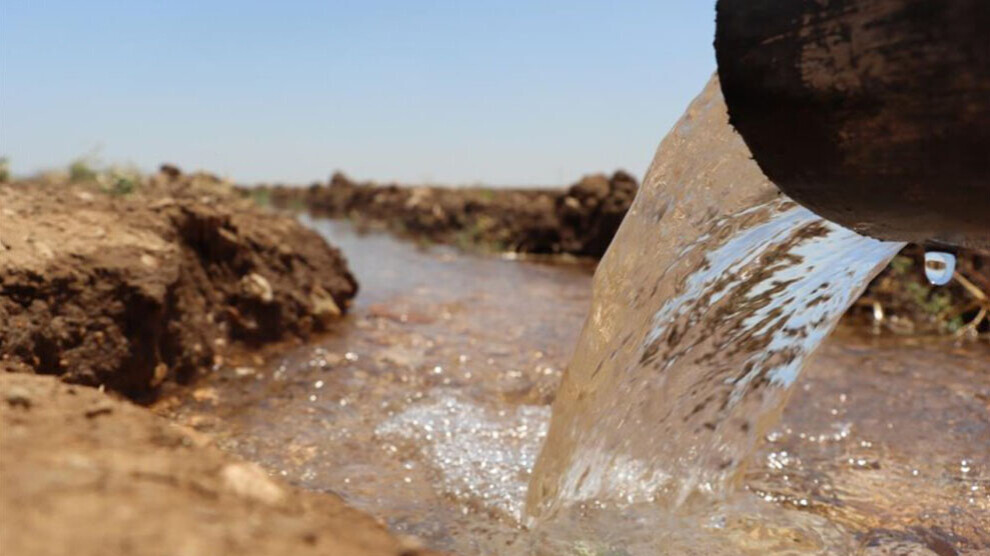Agriculture is one of the main causes of desertification due to its massive water consumption. In Northern and Eastern Syria, attempts are being made to stop the desertification process through drip irrigation.

ANF
NEWS DESK
Tuesday, 18 June 2024, 07:50
Northern and Eastern Syria are known for the fertility of their soils and the abundance of their water resources. But due to man-caused climate change, ongoing drought, war, the use of water as a weapon by the Turkish state and the lowering of the groundwater level through excessive use of deep wells, agriculture and nature are threatened and a process of desertification is setting in. Large agricultural areas can no longer be cultivated due to the high water requirements of traditional irrigation methods.
Solar energy is a major challenge due to the embargo
To counteract this process, more and more farmers and agricultural cooperatives are switching to modern methods of irrigation. Mohammed Said Ismail is one of them. In one step, he switched the pumps used to irrigate his fields from diesel to solar energy. This achievement should not be underestimated, as each solar cell has to be transported across borders closed by various embargoes. Said Ismail has been cultivating around six hectares of land near Amûdê for 20 years. Since agriculture still relies on deep wells, attempts are being made to reduce the amount of water extracted to the bare minimum. Like many others, Said Ismail uses drip irrigation.
Ismail told ANHA news agency that the drip irrigation system is more suitable than the old methods in terms of protecting groundwater, avoiding fuel waste and protecting the environment: "Those responsible in the region can implement new strategic plans for agriculture. They can also support the agricultural sector by lending the farmers money to introduce new irrigation methods."
Ahmed Ramadan al-Khalaf has been a small farmer for 25 years. He has around 1,500 square meters of agricultural land, which he has been cultivating for 25 years. He has also been using solar energy for irrigation for five years.
Al-Khalaf stressed that he is happy that with solar energy he no longer uses fuel and no longer has problems with the generators. However, he has not yet been able to switch to drip irrigation. However, he is aware that the classic irrigation methods use far too much water.
The old irrigation system is only 50 percent efficient
Agricultural engineer and environmental activist Mohammed Said explained: "There are two methods for irrigation: the method used since the invention of agriculture and the new modern irrigation system. The old methods involved filling the fields with water, but the efficiency of this method is low and does not exceed 50 percent. This method uses a large amount of water. Even the roots of the plants cannot use so much water. Therefore, the water either flows away or disappears."
Agricultural engineer warns of desertification
Said pointed out that the flow of water washes away the surface layer of the soil and weakens the soil over time: "The use of this method and the neglect of the soil's mineral needs, fertilization and incorrect crop rotation lead to a decline in water resources. Desertification will occur in these regions in the foreseeable future."
"Business as usual" endangers food security
Said warned that business as usual would endanger food security, explaining that this depends on water security, that water is the lifeblood of agriculture, and that reducing surface and underground water resources would have a negative impact on agriculture and thus on food security. Modern irrigation methods could reduce water requirements by around 40 percent and increase harvests: "This method reduces excessive water consumption and also reduces the risks of desertification. With this method, water resources can grow again, soil fertility and agricultural productivity can be improved. At the same time, soil moisture is increased, thus preventing soil erosion and desertification."
Campaign for environmentally friendly energy for Rojava
There is currently an international fundraising campaign for environmentally friendly energy production in Rojava. The energy supply is generally on the verge of collapse due to Turkish attacks. Electricity often has to be produced in a decentralized way, using diesel generators that emit noise and toxic substances. This also has a massive impact on agriculture, which is dependent on pumps. The campaign aims to raise one million euros for a decentralized solar energy supply in Rojava. This will provide municipal facilities, hospitals, schools and women's shelters with electricity.
The fundraising campaign can be found at

No comments:
Post a Comment